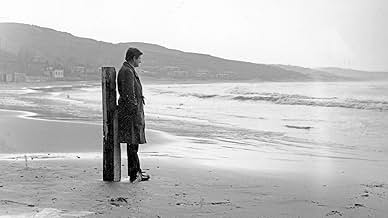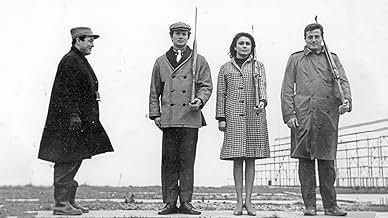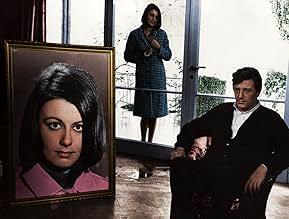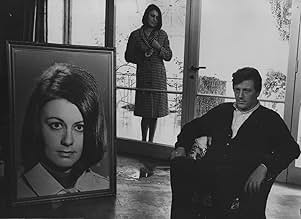VALUTAZIONE IMDb
7,9/10
8282
LA TUA VALUTAZIONE
Un povero pittore si innamora della fotografia di una donna mentre lavora in una delle imponenti ville delle Isole dei Principi di Istanbul.Un povero pittore si innamora della fotografia di una donna mentre lavora in una delle imponenti ville delle Isole dei Principi di Istanbul.Un povero pittore si innamora della fotografia di una donna mentre lavora in una delle imponenti ville delle Isole dei Principi di Istanbul.
- Regia
- Sceneggiatura
- Star
Recensioni in evidenza
It looks like a Mexican soap opera, absurd plot from beginning to end, ridiculous dialogues, very bad sound effects, one wonders, and where is the director? Or maybe it was the time and what was done in Turkey, the villain is very bad, the good one is poor, fetishist and stupid. At least the woman does not follow a submissive role, but she does lose love, like a good soap opera. The music tires. The scene of the father-in-law and the son-in-law is pathetic, only the photography stands out, it is very contemplative and tired, a predictable ending, it could be a short film of 20 minutes maximum, it is to be seen in 2x if possible or avoid it completely.
'Time to Love' is one of the best films of its time, not only in Turkey, but also in the world. Of course, in addition to director and screenwriter Metin Erksan and his staff, Musfik Kenter and Sema Ozcan, cinematographer Mengu Yegin also had a large share in it.
Erksan's usage of objects and symbols to create a contrast between Halil and Meral leads people to comment on these characters generally on the basis of their way of life in accordance with their cultural background and origin representing West and East. However, I think the very core of the different sights of these characters comes not from the set of cultural codes but from the unique sense of world-views appearing in their stances whenever there is an act of contact between two.
There is, however, a certain difference between these two as Meral's reaction to an emotion is something rather prepared and ordinary compared to Halil's point to make a beginning. Meral is nearly a stereotype from the life of a woman who is rich but depressed, having a relationship from her own circle but without the affection of an idealized love, looking for a way out, an adventure. With this kind of a state of mind, she never commences with the romance itself when she meets Halil, it is only a prepared starting point, a railway instead of a junction. She simply finds her reason to live, a story that is known from the beginning with no intention of a subjective initiative. I think this is the very reason that she is seen with her two friends in the beginning, three women, copies of a same kind.
Her picture, on the other hand, is something else. Her picture is Halil himself, his all reason, affection, story of a different origin. Halil starts off with this picture itself unlike Meral, as far as we know at least, because Meral's situation is given with her own statements when she talks to Basar as she explains that she already did not love him anyway and she was not thinking that people can love actually, and besides all these, her whole situation coming to existence only as a reaction, not as a construction. This difference creates the possible conflict expected between two characters which is later destroyed by the movie's melodramatic tendencies, unfortunately.
Halil's stance and perspective differ greatly from that of Meral's and many people as well. He reveals an awareness of a certain progress presenting a blurred sense of inanimation filling the space for an irrationalized status of an emotional story that which we call love as inanimation creates a necessity for a subject to be aware of his own effort leading to a progress as opposed to the animate circumstance of two subjects inside the same story. By creating and constructing his own story Halil has a unique sense of authority of his life collecting emotions from an unprecedented source unlike a ubiquitous presence of a romance.
Apart from all these, Halil's well-established stance towards love and life and the movie's originality, in the time of a melodramatic madness in Turkish cinema, cannot escape from that fictitious and synthetic atmosphere. That destruction vitiates the movie beyond measure. It may be about the production problems for Metin Erksan, but without a doubt that melodramatic sense of storytelling debases the movie.
There is, however, a certain difference between these two as Meral's reaction to an emotion is something rather prepared and ordinary compared to Halil's point to make a beginning. Meral is nearly a stereotype from the life of a woman who is rich but depressed, having a relationship from her own circle but without the affection of an idealized love, looking for a way out, an adventure. With this kind of a state of mind, she never commences with the romance itself when she meets Halil, it is only a prepared starting point, a railway instead of a junction. She simply finds her reason to live, a story that is known from the beginning with no intention of a subjective initiative. I think this is the very reason that she is seen with her two friends in the beginning, three women, copies of a same kind.
Her picture, on the other hand, is something else. Her picture is Halil himself, his all reason, affection, story of a different origin. Halil starts off with this picture itself unlike Meral, as far as we know at least, because Meral's situation is given with her own statements when she talks to Basar as she explains that she already did not love him anyway and she was not thinking that people can love actually, and besides all these, her whole situation coming to existence only as a reaction, not as a construction. This difference creates the possible conflict expected between two characters which is later destroyed by the movie's melodramatic tendencies, unfortunately.
Halil's stance and perspective differ greatly from that of Meral's and many people as well. He reveals an awareness of a certain progress presenting a blurred sense of inanimation filling the space for an irrationalized status of an emotional story that which we call love as inanimation creates a necessity for a subject to be aware of his own effort leading to a progress as opposed to the animate circumstance of two subjects inside the same story. By creating and constructing his own story Halil has a unique sense of authority of his life collecting emotions from an unprecedented source unlike a ubiquitous presence of a romance.
Apart from all these, Halil's well-established stance towards love and life and the movie's originality, in the time of a melodramatic madness in Turkish cinema, cannot escape from that fictitious and synthetic atmosphere. That destruction vitiates the movie beyond measure. It may be about the production problems for Metin Erksan, but without a doubt that melodramatic sense of storytelling debases the movie.
This is the best Turkish film I have ever seen even though it was filmed in 1965. The film stories a man who fell in love with a picture of a woman. The man represents eastern understanding of love which desires not to be with his lover. Because he is afraid if the lover is different than his dreams and his love itself gives a great pleasure to him, not the lover, this pleasure makes him a lover. Our female character Meral is a typical western woman with her relationship with her friends musical preferences etc... Love of this two characters lets us to analyze both of the cultures. Beautiful view of 1960's Istanbul makes you feel the heavenly atmosphere.
This is the first film from the 60s that ive seen. I am really impressed by the style of this film and the attention to detail in the faces and the landscape alike. The constant rain in an island off the coast of Turkey is a perfect setting for this tale about a prideful painter who falls in love with a painting of a woman whose house hes working on. He says he fell in love with the picture and not the woman. In a way hes describing the kind of love that many people fall victim. Wanting to feel safe knowing that your beloved wont judge you as long you never engage in any love that is never certain. It's beautiful, romantic, full of longing. The male performance was kind of wooden but the rest of the cast makes up for it. Especially the woman who is luminous , especially against the landscape. This film breathes so beautifully like few films to. The pacing is gorgeous, the cinematography is captivating, the images tell the story like real cinema can.
Lo sapevi?
- QuizIt couldn't be shown on the cinema because the film hadn't found a distributor.
- ConnessioniFeatured in Gise Memuru (2010)
- Colonne sonoreOrgan Music
Composed by Johann Sebastian Bach
I più visti
Accedi per valutare e creare un elenco di titoli salvati per ottenere consigli personalizzati
- How long is Time to Love?Powered by Alexa
Dettagli
- Tempo di esecuzione1 ora 31 minuti
- Colore
- Proporzioni
- 1.37 : 1
Contribuisci a questa pagina
Suggerisci una modifica o aggiungi i contenuti mancanti

Divario superiore
By what name was Time to Love (1965) officially released in India in English?
Rispondi























